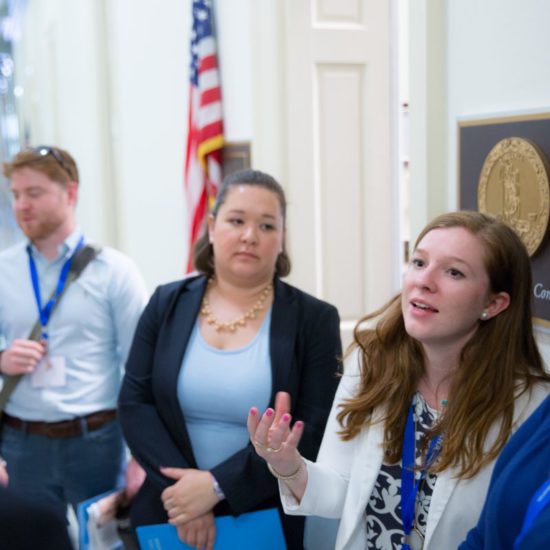
Dr. Patricia Sharpnack is Dean and Professor at The Breen School of Nursing, Ursuline College in Cleveland, Ohio. She has been involved with the RWJF Ohio Action Coalition, the Ohio Board of Nursing and the Governor’s Task Force on Patient Centered Medical Homes. She is a strong advocate for social justice.
Nearly 3 million people in Ohio are covered by Medicaid which is 21% of the total population. While four in five (79%) of enrollees are children and adults, more than one-half (59%) of the state’s Medicaid spending is for the elderly and people with disabilities. Ohio’s uninsured rate has dropped to 5.6 % – the lowest it’s ever been – due in large part to Medicaid expansion, which reduced the uninsured rate by nearly 18% for Ohioan’s between the ages of 19-64. Over 702,000 persons were added to Medicaid with the expansion in Ohio; of these new Medicaid recipients, 43.2% were employed; 55.8% were men; 71.5% were white; 24.8% were black; 13.1% had at least a four-year college degree; and 15.7% were married.
Recently, the Ohio General Assembly mandated the Ohio Department of Medicaid to seek federal approval for a Medicaid work requirements waiver. Until now, work requirements have not been consistent with the goals and objectives of the Medicaid program. Initial projections by interested groups claim that any gains that Ohio saw in healthcare access will be compromised by this work requirement waiver.
To make this request for a waiver even more confusing and complicated, lawmakers have called for counties with high unemployment rates to be exempted from the work requirements entirely. So, is this fair or foul? Should employment be a requirement of Medicaid coverage …? Or is there something fishy about this waiver and request for exemptions?
There are some facts to consider when looking at these waiver exemptions. Ohio counties with high unemployment tend to be rural areas, which are predominately populated by low-income white people. Meanwhile, low-income African-Americans tend to be concentrated in large counties where low unemployment in suburbs prevent the inner cities from qualifying for the exemption.
Interestingly, while African Americans make up only 23% of the Medicaid population in Ohio, only 1.2 % would qualify for the unemployment exemption. In contrast, white people make up over 57% of the total affected population, yet, they will make up 85% of those eligible for the unemployment exemption. This means more than 300,000 are at risk of losing healthcare coverage.
What does this mean? The fact is uninsured are less likely than those with insurance to get preventive care or treatment for major health conditions and chronic diseases. People without insurance are more likely to delay care and experience declines in their overall health, which ultimately could increase health care costs overall. People who lose Medicaid coverage because they don’t meet a work requirement will still get sick, still need medical care, and in the end their care will cost more because research has shown that people without insurance delay care and are more likely to be hospitalized for avoidable health problems.
Work requirements have implications for all populations as those who are already working still must successfully document and verify their compliance. Those who qualify for an exemption also must successfully document and verify their exempt status, as often as monthly. States would need to pay for the staff and systems to track work verification and exemptions.
Consider the story of Rachel, her husband Jim, and two children under the age of five, a married couple in Cleveland, Ohio. Jim lost his job in 2009, because the company he worked for went out of business. He has been employed as a seasonal concrete worker, without benefits – the only job he could get. Jim has health problems because of the concrete work that he does, and congenital issues. Also, before they were eligible for Medicaid, they paid out of pocket for the first child’s birth using a credit card. Jim and Rachel’s average monthly income is just $900. Between rent, food and general expenses, they just cannot make ends meet. Their credit card debt for the hospital birth, which occurred before they were eligible for Medicaid has crippled their ability to save money, or even have enough food on the table. Jim’s work is not certain, and as a result, he would lose coverage. Without Medicaid, the family would be unable to afford healthcare coverage.
Expanding Medicaid — whether traditionally or using a different approach — has improved rates of coverage in Ohio and Indiana more than in Kansas, which has not expanded its program. Work requirements will not produce the intended results and should be closely monitored.
Help people like Jim and Rachael and their family. Write to your senator or representative to oppose the work requirement for Medicaid recipients. Work toward social justice. If work requirements are a great idea, why exempt rural constituents? If you want health insurance provided by taxpayer’s dollars, then all persons, regardless of a city or country zip code should be expected to find work. That includes moving to a place where you can be gainfully employed. Or do the right thing and provide healthcare coverage for the most vulnerable in our community. They may be your neighbor, or someday, you and your family. Please write or call your state legislators to make them aware of the needs of your community.
You can learn more about healthcare coverage and social justice at the Commonwealth Fund.
Editor’s note:
On Friday, June 29th, a federal judge blocked work requirements for Medicaid patients in Kentucky, ruling that they were “arbitrary and capricious.” This decision came just days before new rules mandated by Gov. Matt Bevin’s administration were set to go into effect.There is no clarity from CMS, however, about how the ruling could impact approved or pending waivers for Medicaid work requirements. Seven states are still awaiting a decision: Arizona, Kansas, Maine, Mississippi, Ohio, Utah and Wisconsin.







